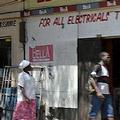在辛巴威布拉瓦約的一個貧窮且人口高度密集的小鎮,一名年輕婦女俯身朝向路旁,那兒有個水漥延伸至路面上。這名婦女將水舀到水桶中的景象,突顯了這座有著超過兩百萬人口的城市中,許多人的困境。
雖然辛巴威地區自2007年大雨不斷,然而自來水主要管線截至目前為止仍持續呈現中斷的情況。在近期重創布拉瓦約的其中一場大雨過後,婦女表示,「這些水是用來洗澡的。」駕駛人對降下大雨怨聲連連,因為路面較深的坑洞使他們身陷濺起的水花之中,然而對於其他人而言,水漥卻成為他們活下去的希望。
布拉瓦約正面臨近年來最嚴重的水危機,布拉瓦約當局表示,他們並不會立即啟用水源配給的緊急系統,即便豪雨目前已使供應布拉瓦約的水庫達到滿水位。
在市府鑿的簡易井旁,排隊取水的人龍已成為白天常見的景況,民眾的怒火也因此逐漸平息。日前才有一名男子被人用啤酒瓶砸傷頭部,就因為居民們互爭誰應該先拿到水。而一般家庭從常年蓄水的水塘汲取雨水使用,但是水質過髒不適於飲用或烹煮。
政府官員表示,水源短缺並非導因於水源不足,而是政府外匯不足以購買可淨化水質的化學藥物。布拉瓦約飲用水的短缺,其實與市政府和辛巴威國家水利署彼此間的僵持息息相關。
水利署被視為一個從市政府分離出來、新成立的機構,負責供應辛巴威所有市中心的用水。然而,水利署截至目前為止的表現,已受到嚴重抨擊。而受到反對黨「民主改革運動」所控制的布拉瓦約市政府則不願接管。
哈拉雷(辛巴威首都)政府明確表示,只要布拉瓦約市政府不接管水利署,當地政府將不會得到任何來自中央的協助。一名匿名的市議員表示,「此種情形是前所未見的。市政府現在正向企業募款,以購買淨水化學藥品。在處理諸如此類的議題上,地方政府理應取得政府的授權。」
 市政府官員指出,位於布拉瓦約的官方部會是延宕此事件的始作俑者,其積欠了幾兆元辛巴威幣的水費—相當於數百萬美元。市方也在國家歲收入暨價格委員會的壓力之下維持低廉的水費,是政府為對抗去年夏天通貨膨脹的價格調整政策的一部分。布拉瓦約當局表示,低歲收標準的結果,也影響了水處理與運送的能力。
市政府官員指出,位於布拉瓦約的官方部會是延宕此事件的始作俑者,其積欠了幾兆元辛巴威幣的水費—相當於數百萬美元。市方也在國家歲收入暨價格委員會的壓力之下維持低廉的水費,是政府為對抗去年夏天通貨膨脹的價格調整政策的一部分。布拉瓦約當局表示,低歲收標準的結果,也影響了水處理與運送的能力。
城市中更惹人注意的憾事則是,布拉瓦約市立醫院現在要求準媽媽們入院生產時自行備水使用。一名在有許多勞動階級的、位於城郊的市立醫院工作的護士進一步補充,「更糟的是,這些懷孕婦女若不能付清醫療費用,就會被迫滯留在診所內無法回家。」
A young woman stoops by the roadside in one of Bulawayo’s poor, high density townships where a huge water-filled crater extends into the road.
The sight of this woman scooping water into a pail highlights the plight of many in this city of more two million, where mains water cuts have continued this year despite the heavy rains that have been pounding Zimbabwe since last year.
"I use the water for ablution purposes," she said after another round of heavy rains hit Bulawayo recently.
While motorists curse the coming of the rain because of the deep potholes it leaves in its wake, the craters have become a lifeline, of sorts, for others.
Bulawayo is facing its worst water crisis in years, and the city authorities say they are not about to lift the stringent system of water rationing, even though heavy rains are now filling up the reservoirs which supply the city.
At the council-run boreholes, long queues have become the order of the day and tempers flare. Recently a man was struck on the head with a beer bottle as residents fought over who should get water first.
While families have resorted to using rainwater from standing pools, it is too dirty to be used for drinking or cooking.
Officials say the shortages are caused not by the lack of water as such, but by the lack of foreign currency needed to purchase purification chemicals.
The shortage of potable water in Bulawayo is closely connected with a standoff between the city authorities and the Zimbabwe National Water Authority, ZINWA.
ZINWA is a recently formed agency which is supposed to be taking from municipal authorities as the supplier of water to all urban centers in Zimbabwe. However, its performance to date has been heavily criticized, and Bulawayo City Council - controlled by the opposition Movement for Democratic Change, MDC - has resisted the takeover.
The government in Harare has made it clear that as long as the takeover is resisted, the local authority will not get any assistance from the center.
"This is unprecedented," a councillor said, speaking on condition of anonymity. "The council is now begging for money from companies so it can purchase water purification chemicals. This is a local authority and rightly should get a government grant to deal with such issues."
Council officials say it is government departments based in the city that are the major defaulters, having run up trillions of Zimbabwean dollars - or millions of US dollars - in unpaid water bills.
The city is also under pressure from the National Incomes and Pricing Commission to keep water charges low, as part of the price-fixing policy the government imposed to combat inflation last summer. The authorities in Bulawayo say the resulting low revenue levels have also affected their ability to treat and deliver water.
Further highlighting the extent of the city water woes, Bulawayo council clinics are now asking expectant mothers to bring their own water with them when they come in to give birth.
"What has compounded the matter for the pregnant women is that they now spend days detained at the clinics as they cannot be released to return home without fully paying the clinic bills," said a nurse in one the council clinics situated in one densely populated working class suburb.
全文及圖片詳見 :ENS


